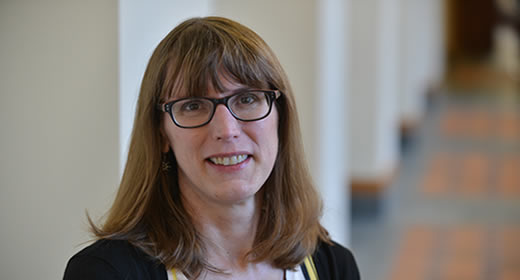
In some ways, Kristin Seefeldt’s (MPP '96, PhD '10) career will come full circle this fall as she takes on a new role as associate director for educational programs at the University of Michigan’s Poverty Solutions.
Seefeldt served as assistant director of the National Poverty Center from 2004 to 2010, when U-M hosted the federally-funded research center that preceded Poverty Solutions, which was established as a university-wide presidential research initiative in 2016.
Since her time at the National Poverty Center, U-M’s approach to poverty research has evolved, Seefeldt said, from more traditional academic research to emphasizing real-world solutions and more directly responding to the needs of service providers and policymakers.
“It feels right,” said Seefeldt, who holds an MPP and a PhD in sociology and public policy from U-M. “It’s sort of the logical next step in what we as a university should be doing.”
The new associate faculty director position will expand Poverty Solutions’ efforts to engage more faculty and students in meaningful research opportunities, said the initiative’s founding Faculty Director H. Luke Shaefer.
“Kristin brings her national reputation as a scholar, her experience in the administration of a poverty center, and I think a track record of being a terrific teacher,” Shaefer said. “It was an obvious fit, so I’m just delighted that she was up to take this role.”
Seefeldt will maintain her appointment as associate professor of social work and public policy. At Poverty Solutions, she plans to increase student engagement and expand educational programming, with a focus on involving more doctoral students in poverty research.
“There are a lot of PhD students who don’t want to produce research that only other academics consume. They want to be involved in something that’s meaningful and can affect change,” Seefeldt said.
“But they also have to sort of balance that with the requirements of the program and the hurdles you need to clear to finish and get a job,” she added. “I think there are some real opportunities to find the right balance for those students.”
It’s a balance Seefeldt has struck in her own career.
She says she fell into poverty research “by chance” during an internship at the Urban Institute in Washington, D.C., while completing her undergraduate degree at Georgetown University. She felt an immediate connection to the work.
“For me, it felt like a way to do work that could be really meaningful and also give a voice to the people who either get shut out of policy and political discussions altogether or have a lot of very dangerous stereotypes developed about them,” Seefeldt said.
With the exception of two years at Indiana University, Seefeldt has spent her career at U-M. In addition to her time as assistant director of the National Poverty Center, she was an assistant research scientist at the Population Research Center and the Ford School.
She began her research career working with large survey datasets but soon saw an opportunity to have more impact with qualitative studies that center the personal experiences of a small number of individuals or families.
That approach led to her award-winning 2016 book, “Abandoned Families: Social Isolation in the 21st Century,” which pointed out how institutions intended to promote social mobility had abandoned striving families in Detroit, as evidenced in the experiences of 45 women Seefeldt interviewed annually from 2006 to 2011.
Seefeldt’s research also has chronicled the employment and work-life balance challenges facing former welfare recipients, assessed how well America’s “safety net” programs worked during the Great Recession, and provided insight on a variety of other issues related to work and economic well-being for vulnerable families.
Most recently, Seefeldt received a grant from the Russell Sage Foundation to continue research seeded by Poverty Solutions that examines how blue collar retirees provide financial and practical help to their adult children and extended family members.
“I really feel like this is the kind of work I’m best at and where I can make a contribution,” she said. “I do think it’s so important for people’s voices to be heard.”
Read the original story written by Lauren Slagter published on Poverty Solutions website.